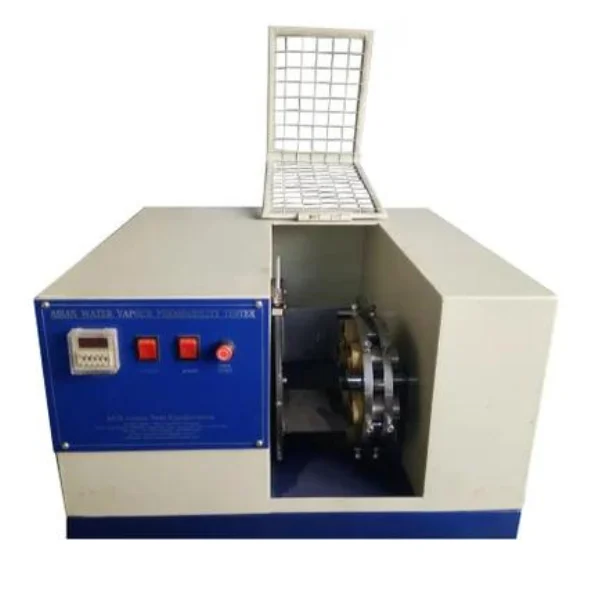
A Water Vapor Permeability Tester is an instrument designed to measure the permeability of materials to water vapor. This property is crucial in various industries, including textiles, packaging, building materials, and pharmaceuticals. The permeability of a material to water vapor is an important factor in determining its suitability for specific applications. Here are some key aspects of water vapor permeability testing: Purpose: Quality Control: Water vapor permeability testi....
A Water Vapor Permeability Tester is an instrument designed to measure the permeability of materials to water vapor. This property is crucial in various industries, including textiles, packaging, building materials, and pharmaceuticals. The permeability of a material to water vapor is an important factor in determining its suitability for specific applications. Here are some key aspects of water vapor permeability testing:
Purpose:
Operation:
Applications:
Features:
Advantages:
Compliance:
When using a Water Vapor Permeability Tester, it's important to follow the testing standards relevant to the industry and material being tested. This ensures that the results are reliable and consistent across different testing scenarios.

Corrosion test chamber is a great laboratory test equipment widely used in metal...
Cyclic Corrosion Salt Spray Chamber manufactured by Sigma Machines – the world...
Sigma Machines CASS tester is designed keeping in mind the relevant tester stand...
Ensure the quality and durability of your materials with our reliable Double Hea...
SIGMA Machines is counted among the best salt spray chamber manufacturers in Ind...
Enhance your testing capabilities with our advanced digital pounding tester...
Enhance your foam testing process with our advanced PU foam Indentation Hardness...
Enhance your yarn quality control with our reliable and efficient yarn strength ...
Get accurate results with our Shear Fatigue Tester for PU Foam...
Ensure precise measurements of soft materials with our reliable thickness gauge...
Enhance your understanding of ball performance using our reliable Ball Resilienc...
Asian Water Absorption Tester is Water Resistance Tester For Sole Leather- (Perm...
Discover the ultimate laundry solution with Laundrometer Digital Model - the per...
Enhance your testing process with Test Template D and achieve accurate and relia...
Ensure the safety of children's toys with our reliable and efficient flammabilit...
The humidity test cabinet provides a sample with the humidity that the materials...
Ensure accurate results with our advanced Bundesmann Apparatus Tester for compre...
A Hot air oven is a great tool for manufacturers to accurately test materials i...
hydrostatic testing equipment used for testing lateral pipes is located within a...
Enhance belt quality control with our Belt Flex Tester, providing accurate and r...
Rockwell Hardness Tester models are suitable for accurately testing the hardness...
Martindale abrasion machine is suitable for testing the pilling degree and abras...
Adhesion Strength Tester serves the purpose of measuring the peelability or perm...
ASIAN Bursting Strength Tester Machine is especially useful for measuring the pa...
Achieve superior strength and resilience with our cutting-edge tensile strength ...
Enhance your quality control processes with our reliable Impact Tester, providin...
Ensure accurate measurements of your drapes' performance with our reliable Drape...
Glow Wire Test Equipment is an important testing equipment which is used in the ...
The heat distortion temperature of the polymer in the test is identified as the ...
Range: 2000 lbs with 1 lbs least count digital display Elongations: Up to 9...
Torque Tester for Bottle Caps is one of the important instruments to calculate t...
The “ASIAN” Universal testing machine provide a relatively inexpensive way...
Asian Melt Flow Index Tester helping evaluate the flow properties of melted plas...
Size of the Test Specimen: 40 X 15 mm Distance between edge of the Crease...
Box Compression Tester is used to measure the box compression strength (BCT), sh...
Enhance your material testing capabilities with the advanced Demattia Flex Teste...
Enhance your understanding of material properties with our Oscillating Disk Rheo...
Enhance your scientific experiments with our Specific Digital Gravity ...
Looking for an accurate and reliable IRHD Rubber Hardness Tester? Look no furthe...
Explore the world of direct reading specific gravity balance through our informa...
Enhance your testing efficiency and accuracy with our state-of-the-art universal...
Discover the Cone Calorimeter Tester: Enhance fire safety with accurate and reli...
Enhance your testing capabilities with a state-of-the-art dry sand abrasion test...
.jpg)
Get In Touch With Us
See How your Business Can benefit With
Sigma Machines
Get Estimated Quote
